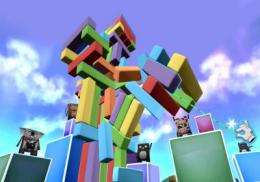Study to see if video games can boost thinking skills in elderly

Researchers at North Carolina State University and the Georgia Institute of Technology have received a $1.2 million grant from the National Science Foundation to study whether and how video games can boost memory and thinking skills in the elderly - and then to use their findings to develop a prototype video game to do just that.
The researchers will use the grant money, which is part of the federal stimulus package, to fund a two-phase research initiative. In phase one, researchers will ascertain whether certain qualities that can be found in video games result in improved cognitive functioning in older adults. Cognitive functioning refers to memory, problem-solving, critical thinking and other mental skills.
Dr. Anne McLaughlin, assistant professor of psychology at NC State and the principal investigator (PI) for the grant, explains that the first phase asks: “What qualities does a game need to contain to improve cognition? We want to determine the components an effective game should have.”
In phase two, once the researchers have determined which qualities result in the most significant improvements, they will develop a set of guidelines that can be used to design a new class of video game for older adults, as well as a prototype video game that follows those guidelines. The NSF grant spans four years, from September 2009 to August 2013.
McLaughlin says previous research suggests there are three qualities in video games that may foster improved cognitive functioning: attentional demand, novelty and social interaction. Attentional demand is the degree to which an individual has to focus attention on a task in order to complete it successfully. Novelty, or exposure to a task one has not encountered before, “may also be relevant,” McLaughlin says, “because existing research shows that novelty is a catalyst for learning.” Social interaction should also encourage players to devote more attention and effort to the game.
The researchers will test the cognitive functioning of participants, men and women 65 years old and older, to establish a baseline. They will then have participants play BOOM BLOX™ or BOOM BLOX™ Bash Party, Wii™ video games developed by Electronic Arts, before testing the participants’ cognitive functioning again. BOOM BLOX and BOOM BLOX Bash Party are games in which novelty, attentional demand and social interaction may be manipulated by the researchers.
“For example, if we find that novelty and attentional demand improve cognition, we’ll then develop a game that focuses on that,” McLaughlin says. Dr. Jason Allaire, an assistant professor of psychology at NC State who is co-PI on the grant, explains that developing a new game highlighting the qualities that seemed to have the greatest impact on cognitive functioning “will allow us to see if we can get greater benefits that might transfer to real-world outcomes such as remembering to take medication.”
McLaughlin and Allaire will be working with Georgia Tech Research Scientist Maribeth Gandy to develop the prototype game based on their research findings.
More information on this project is available at www.gainsthroughgaming.org .
Source: North Carolina State University (news : web)















